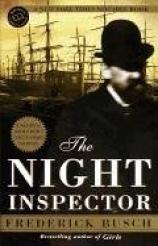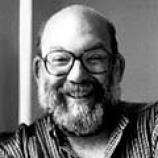Excerpt
Excerpt
The Night Inspector

CHAPTER ONE
"No mouth," I told him.
"If I'm to craft a special order for you," he said.
"What is that, a special order?" "Why, this." He held up the sketch. I looked away from it. "The mask, Mr. Bartholomew," he said. "I make arms. I make legs. I've never made a face, sir."
Through the smell of resin and shellac, through the balm of pine shavings, came the odor of his perspiration, and I thought of bivouac, and our stench on the wind. His thick, ragged, graying eyebrows were stippled with sawdust, as was his mustache. One of the knuckles of his broad hand was bloody, and the end of the other hand's long finger had been cut away many years before and had raggedly healed.
"Yes," I said. "Special. I thought at first you meant order of being. Race. A species of man, perhaps. A special order of nature. I cannot abide such speculation. We have collectively demonstrated, and not that many months before, the folly of such thinking."
He smiled at the drawing, but not at me, and he shook his head. "No, sir," he said. "You are enough like the rest of my custom. Only your face is maimed, Mr. Bartholomew. You have your limbs, God forgive us."
"I suggest that I am proof of His unreadiness to do so," I said. We examined his sketch again, and he spoke to me of materials and money. It was to be of pasteboard, he decided, so that my head would not be weighed down. He would build many thin layers, each molded to the one beneath, and would protect them with paint, the better to keep away the deleterious effects of rain and snow. Withal, my head would not be burdened, on account of the lightness of construction. "Like a little craft on the sea," he suggested. I had to smile. He had, it was clear, to look away.
And in the end, he prevailed, and he shaped me a mouth.
I did hear of several who used a buffalo gun, and at first I thought it a lie. How could you haul such a heavy piece of metal and wood up a tree? Not to mention aim with accuracy, or reload with speed? From a hilltop redoubt: yes. With a tripod under the front of that immense, octagonal barrel. But never in a tree, I thought, and of course I was wrong. It was one of my lessons in this long education I received about and from my native country. Never consider a feat undone if the reward is of a size. We move what we must, whether barrels of meat or kegs of dead flesh, when at the farther end of the transaction there lies a crate of dollars. That is how we fare westward, in spite of reversals, anguish, and death.
That is why some very few of us served with the volunteers of New York as what we called marksmen. Snipers,the men of infantry or horse called us, and, behind our backs, assassins.An Englishman I met said thugs.In the woods around Paynes Corners, where I was born, the hamlet lying two hundred miles and more from Manhattan, a small crossroads and then a church and a fur-trading shop for victuals, I learned my forest craftiness. I could hide, and I could seek. I was a solitary child, and powerful of limb. And I was reckless, and born with great vision, though not, alas, of the interior, spiritual sort. But I saw in the dark if there was a hint of a sliver of moon in the sky. How natural, then, with my youth and young manhood passed in patrolling a trapline and hunting for my meals, that I would make a marksman when called to the War.
It was a Sharps that I carried into the trees. I wore a pannier of sixty rounds, and always a pistol in a holster at my back. The knife I wore at my left side, and I drew with my right. It was good for game, and bad for men, I once told the sergeant who saw me out and up and hunting Rebels.
"Kindly do not boast of the assassinations, Mr. Bartholomew. You fire your weapon, but in this chain of command, you are my weapon. And I think we owe it to the dead to never boast about our work."
"It is the brigadier's wish and your command that I take to the trees and shoot men down."
"Truly said, Mr. Bartholomew. I wonder if I rebuke myself while addressing you." He looked away as he spoke, though I was whole of face, and had smooth enough skin, and all of my nose and lips and jaw. I watched a fly hover at his ear. I thought to seize it, and I could have. He turned, and he read my expression, I suppose, and drew back a pace. "This triumph of ours," he said, "our killing them off, is no pleasure to me. Those are men like us."
"No, Sergeant," I said, "with all respect. They are dead, and we are not, and that's the nature of our transaction."
Smoke from the cooks' wagons blew in on us. He tried not to smile, I think. He said, "As you were, Mr. Bartholomew."
I drew myself taut. He said, "I hope you return safe and well."
"Sergeant."
"And I wonder how you sleep, bless you."
"Fitfully," I said.
He nodded. He caressed his ginger beard, which did not give him the appearance of age I believe he sought. He covered his lips an instant with his fingers, and I saw his fatigue, and his fear, of course. He was from a village up on the Hudson and had been raised in wealth. He was a powerful leader in battle, and in sum a man of strength. Many months later, when the hunters took me down, I tried to ask him to kill me, but I could not work my jaw. He only wrapped my head in what I later learned was his shirt, and he carried me across his saddle, propped against his breast, to a Southern farrier, who thought to cauterize some of the area of wound.
When I had stopped screaming, I heard the sergeant tell the farrier, "You enjoyed that." I heard him cock his piece, and I waited for him to fire. Someone, I remember thinking, should be shot. Then I remembered that I had already filled the bill.
Excerpted from The Night Inspector © Copyright 2012 by Frederick Busch. Reprinted with permission by Ballantine. All rights reserved.
The Night Inspector
- paperback: 304 pages
- Publisher: Ballantine Books
- ISBN-10: 0449006158
- ISBN-13: 9780449006153








